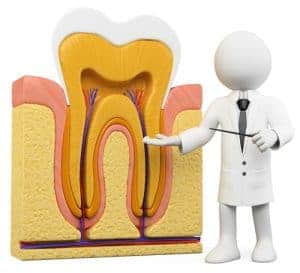
You know the term and you’ve heard rumours about the horror related to a root canal. However, what is a root canal, what actually causes someone to need one, and how does a root canal procedure work? Let’s look at what leads to the causes of a root canal first.
Causes of a Root Canal
The soft tissue inside the root inside a tooth can become infected or inflamed, and that is when endodontic treatment or a root canal is required. Some common causes are as follows:
- A crack or chip in the tooth.
- A crown that is faulty
- Multiple, repeated dental procedures on one tooth
- Deep decay that is the result of neglecting oral hygiene
Some of the causes are beyond your control, so it’s best to focus on the most important preventative measures: regular dental check-ups and good oral hygiene.
What Actually Takes Place During a Root Canal?
The purpose of a root canal is to eliminate the infection from within the tooth. This is achieved by removing the pulp, nerve, and cleaning the inside of the tooth and sealing it to prevent future infection. The nerve is where bacteria builds up and leads to an abscess if it’s not treated. (Abscesses are very painful and dangerous, so you don’t want one).
Because the role of the nerve is to respond to taste sensations, removing the nerve of a tooth will not affect the way you eat but may affect your taste sensations.
Practical Measures You Can Take That Will Minimize Your Chances of Having a Root Canal
Your diet is as important to your oral health as it is to your body’s. To minimize your risk of a root canal, you can take the following proactive steps.
- Regular dental check-ups
- Flossing and brushing daily
- Avoid a lot of sugar and foods with high acid content
- Gargle with mouthwash to help eliminate bacteria in the mouth
Aftercare When You’ve Had a Root Canal
What can you eat and how do you care for your teeth after a root canal? For most patients, the uncomfortable truth is that there will be some pain after you’ve had a root canal procedure. The main causes are usually inflammation and infection. Inflammation may occur when the root canal file has gone beyond the end of the root. Infection is common when the procedure triggers bacteria within the root. The most common source of pain is due to inflammation, not always in conjunction with infection. Once you’ve had a root canal procedure, it’s important to remember that now your tooth or teeth are ready to begin their healing journey. Your mouth will let you know what’s comfortable, but there are some simple guidelines for good aftercare.
- Avoid crunchy, hard foods. This is not the time to indulge your love of corn-on-the-cob. Stick to soft foods and even better, liquid foods like soup until your teeth feel ready for solids.
- Oral pain relievers will help with the discomfort in the days following your procedure. Use whichever over the counter product you would take for joint pain or headaches.
- When you’re brushing or flossing the treated area, be gentle. Vigorous activity will cause tenderness and sensitivity.
- Know your body. There will be some level of pain and discomfort after your procedure. Identify whether this is “normal” pain or something more and make an appointment with your dentist as soon as possible if it’s the latter.
Preventative Measures to Avoid a Root Canal in the Future
Once you’ve had a root canal, you’ll probably be motivated to take better care of your teeth in the future. Hopefully, you will be encouraged to step-up your oral hygiene habits and get into the practice of flossing and brushing regularly. Be sure to maintain a regular appointment schedule with your dentist and be kind to your mouth and teeth by avoiding a lot of sugar and acid in the drinks and foods you consume.
If you suspect you have any of the issues that may lead to a root canal, book an appointment as soon as possible with our friendly team at Bradford Family Dentistry. Because root canals may seem scary, but we’re not!

Schedule Your Appointment Today!
We Can't Wait To See You Smile
